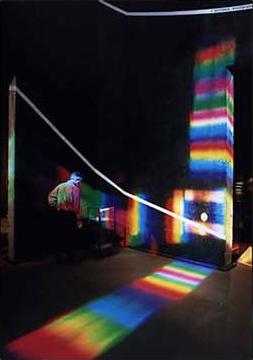Many hours later...
I remember, back in the day when I had started going to church regularly again and becoming more active in the life of the congregation, my pastor asking me to help out with an in-house Lenten devotional booklet themed around the question “Who Is God?” Would I, he asked, like to tackle the Trinitarian understanding of God?
In a classic example of fools rushing in, I said, “Okay.” But the more I tried teasing out one Person from another according to Scripture and the Christian understanding of the Trinity, the more intertwined I found the Three. God the Father is Creator – except that God the Son is the Word, in whom and through whom and for whom all things were made and in whom all things hold together – except that the Holy Spirit is the One who hovered over the primordial chaos and birthed creation. And you could likewise go through all the attributes of God and try to tie each one to one particular Person of the Trinity, only to find that it’s not that simple; that there’s a synergy within the Godhead that makes such an exercise fairly impossible. I know someone who compares it to a circle dance of three Persons holding hands, blurring together in motion.
We Christians find ourselves in a difficult position, trying to affirm a doctrine that anyone who is at all honest with himself or herself will admit is incredibly hard to define.
Which is why I am so fond of Henri Nouwen’s observation that the Trinity is a profound way in which to understand the relational nature of God – that God loves relationships so much, God is a relationship. And why I’m also fond of a friend of mine’s Trinitarian construct of the Lover, the Beloved and the Love that flows between the two.
What does this idea of a relational God mean for us? I think for one thing it suggests that so much of what passes as religious discourse completely misses the point: scorekeeping; nit-picking; line-drawing; handwringing over the factuality of this or that Bible text. Just as we human beings have a talent for messing up our relationships with one another, we have a talent for turning what the mystics among us would call God’s love affair with us into a business transaction, or a self-serving exercise in “I’m right; you’re going to hell” ego massage, or intellectual self-gratification with no root in a real relationship with a passionate and compassionate God.
For another thing, our Trinitarian understanding of the Godhead helps us shape our relationships with God and with one another. When Christ tells us, “Follow me,” one of the ways we follow him is into, on one hand, embrace of the Godhead, and on the other the embrace of our fellow human beings. The Way is not a solitary way. Even persons called, for a time or for the long run, to a life of seeming solitude are called to a life of prayer for and service to others. Julian of Norwich, the great medieval mystic who literally attached her life to that of Christ by becoming an anchoress – someone physically, permanently walled into an apartment within a church in an act symbolic of death to the world – spent her days providing spiritual counsel to the many people who came to her for help. She wasn’t navel-gazing, working her way into some nth degree of enlightenment; she was actively helping the people of God.
It’s a holy Mystery all right, this divine circle dance. And yet it’s a dance we’re all invited to join, spiraling into our own inner circle, surrounded and embraced by the Godhead. And there’s room for everyone. Bring a friend or two.
"Spectrum of Time," Peter Erskine


4 comments:
I've done that! They come in the same kind of tube! Only I didn't manage to stop myself.
botheredly,
connie
I'm just glad it wasn't my bottle of Nair.
*giggle* (visualizing a Nair incident)
Nice post chica.
In Sundays & Seasons, David Lose writes:
"What is God like? This question is difficult, one that the doctrine of the Holy Trinity attempts to answer by urging us to look not at what God is--all-powerful, all-knowing, all-wise--but rather how God is: in constant relationship. The heart of the doctrine of the Trinity, surely one of the most challenging elements of Christian theology, is that God is most fully understood as a relationship of love. Father, Son, and Holy Spirit are joined in a relationship of unity and love that ultimately spills out into the creation.
"As the doctrine of the Holy Trinity witnesses, the compelling factor of the mysterious and holy God we worship is that God is love, a love between Father, Son, and Holy Spirit that reaches out to gather up the whole creation in its tender embrace."
Oh, and by the way, I'm not 100% sure but I think the "Lover, Beloved, and their Love" example comes from Augustine.
Post a Comment